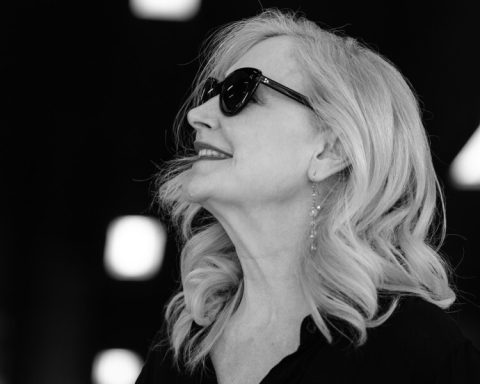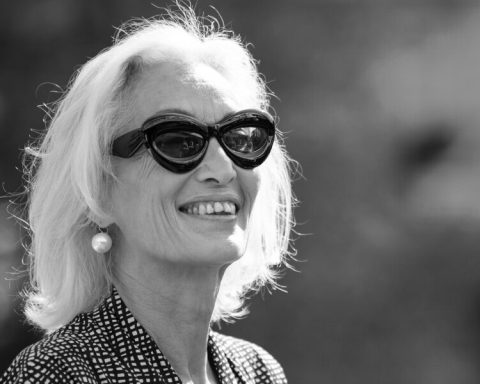In her debut feature, Lost Children, Belgian director Michèle Jacob follows Audrey and her siblings who wake up in an isolated house in the forest and realize their father is gone. The film premiered in the Proxima Competition at this year’s Karlovy Vary International Film Festival.
Jacob, who is a mother, realized that a lot of adults around her were sad and broken and carry a mask on their faces, “I’m sure that’s because they don’t cuddle their inner child. I thought [of speaking] about sadness or unhappy adults. We have to tell children’s stories and how we can fix children [in order] to make happy adults,” she says of how the film came about.
In Lost Children, Jacob plays with different genres, from psychological horror to children’s stories and folklore, “I think when children play, they play with everything. They can mix Playmobile with an old box, with the neighbor’s cat, chips, etc. and they can make their own universe. For this movie, which is set at children’s height, I thought it could be a great playground to mix a lot of things because children can be full of joy, but in the same time, they can be so sad. They can laugh at a funeral or they can be sad at a birthday [party]. I think that’s the children’s rule, the mixing of everything. And I think I’m still a kid,” she concedes.
In her works, including her short film July 96, Jacob doesn’t let children be children, but makes them grow up faster than they normally would by throwing them a curveball and she is highly attuned to children’s sensibilities, “I think children are more aware than adults and they know more than us. They feel more than us. And they’re more intelligent than us in how they feel, how they see people, how they understand the relationships between people. I think that adults, if they listened more to the children, they could understand the world better,” she posits.
Jacob knew the end of her film from the very beginning, “I think that you cannot heal alone among siblings. That’s not possible,” she says, being coil and avoiding to spoil it.
She adds: “For me, the monster was the nightmares, the memories. That’s why the legs of the mother are the arms and the glasses are the eyes, but the shape is the picture that she forgot and it’s like a darkness. The shape of that monster was so freaky to her.”
Jacob says she had been going to psychoanalysis for eight years and that that experience certainly played a part in the conception of her film, “I did psychoanalysis for eight years and that’s the best way to open all the doors in your head. That’s quite funny after you manage your files. The beast was not Rocha because I think, for me, it would maybe be too pretentious or not pure enough. When I was a kid, I was afraid of the dark and the monster is like when you go into your room and you have your clothes on a chair. That’s the monster, that’s the shape you see in the dark. I think everyone can say ‘I have already seen that monster somewhere.’”
The monster in Lost Children is a metaphor for domestic violence, alcoholism, denial, belief in fairytales and how everything is in the power of the mind, “I think in every home, there’s always drama like that. And everything is put in the oven, in a small box, in a suitcase. Here, it’s in the monster,” she observes.
Lost Children is a film for parents rather than children, “It’s not for kids,” she concurs. And speaking of children, Jacob cast her own daughters in two of the leading roles, “I made my short movie with her, so I knew that she’s very professional. She loved that. She’s great! And for the other one, that was harder because she’s like a cat. She’s really sensitive and, sometimes, she’s like a tsunami. She has a lot of emotions,” she says of working with her children on this project.
Jacob is a feminist and even more so with two daughters, “It was really important to talk about violence against women, but the most important for me was that in all the fairytales, or the Walt Disney stories, the mothers are crazy or just not there, or there is a stepmother, and I wanted to create the absence of the mother and a little bit of angriness with her to understand at the end that she is a hero,” she shares.
When it comes to women in film in Belgium today, WIFTM Belgium has been existing since 2020 and more and more women are making films, but not enough, “I think it’s changing very slowly, but it is changing. And we are working with other women. My DOP is a woman. My sound editor is a woman. She’s the boss of her studio. That’s where it’s really important to work with women,” she declares.
She adds: “Recently, I finally saw Jeanne Dielman and it was the best thriller of my life. That was amazing! Three hours and I said ‘Oh my God! She was twenty-five when she wrote that. That’s amazing!’ And it was a slap on my face! That was crazy.”
At the moment, Jacob is working on an eight-episode drama series and will be the first female director ever in Belgium to direct on her own, “For my daughters to see I can do that, too,” she concludes.
Photo credits: KVIFF.
This interview was conducted at the 2023 Karlovy Vary International Film Festival.










